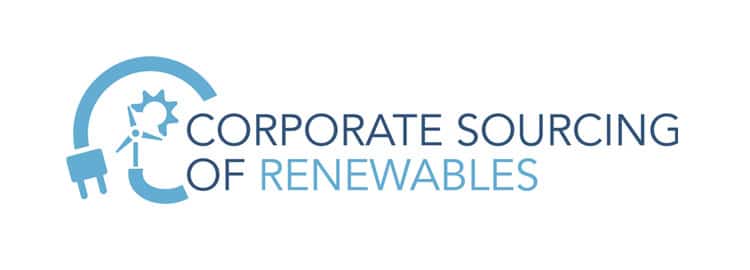Corporate sourcing of renewables

This campaign concluded in May 2019.
ARCHIVED CONTENT:
More and more companies are making commitments to power their operations with renewable energy. Helping to scale up these corporate commitments across multiple markets provides a crucial message to governments and to other companies about the growing demand for increasingly cost-competitive renewable energy. This will drive further cost reductions and deployment and help countries reach and increase their renewable energy goals.
This campaign concluded at the Ninth Clean Energy Ministerial in Copenhagen, Denmark, with a launch of a dedicated REmade Index – a global reference index for corporate sourcing of renewables.
Goals
The campaign, which launched at the 7th Clean Energy Ministerial meeting in San Francisco in 2016, and had been co-led by Denmark, China and Germany, had been successful in promoting corporate sourcing of renewable energy which now takes place in 75 countries, including all CEM Member countries. As of 2018, over 900 corporate Power Purchase Agreement (PPAs) have been signed for about 20 GW, and over 130 companies have joined RE100 – a commitment to switch to 100% of renewable energy.
CEM’s Corporate Sourcing of Renewables campaign closes on a high, with new report launched

The opportunity
Companies, governments, and associations can accelerate the achievement of this goal in many ways. For example:
- Commit to power operations with large shares of renewable energy
- Commit to increasing on-site generation and/or direct procurement of renewable energy
- Help develop policy recommendations and contribute to the development of a policy toolkit for governments
- Share case studies, cost data and other information that can help build the business case
- Host workshops and other programs for information development and exchange
Recognition
The campaign will recognize high-level commitments to help increase corporate commitments to power operations with renewables:
- At the seventh Clean Energy Ministerial (CEM7) meeting in San Francisco, California, on June 1–2, 2016.
- At other high-profile events over the coming year.
- At the eighth Clean Energy Ministerial meeting (CEM8) in Beijing, China, in 2017.
The coalition
Led by the governments of Denmark, Germany, and China, other CEM members participating in the campaign include the European Commission, Mexico, Sweden, the United Kingdom, and the United States. The governments are joined by several partners in this collaborative effort, including the International Renewable Energy Agency (IRENA), the Renewable Energy Buyers Alliance (REBA), RE100, World Business Council for Sustainable Development (WBCSD), World Resources Institute (WRI), Center for Resource Solutions (CRS), Solar Power Europe, Wind Europe, and others.
Read more about commitments made to the campaign in the Corporate Sourcing of Renewables CEM7 Press Release.
Why it’s needed
To raise awareness and build the business case. Solar and wind are increasingly cost-competitive energy sources, yet many companies are unaware of the benefits of locking in these low costs for years to come. The campaign will help spread the word beyond large multinational organizations and across CEM countries.
To drive the market and boost the economy. If more of the world’s companies use their purchasing power to procure and generate electricity from renewable sources, it creates significant market pull. Thousands of additional megawatts of renewable energy will be required, presenting a tremendous market opportunity for renewable energy providers and an economic opportunity for countries. If 1,000 of the world’s most influential businesses become 100 percent powered by renewables, they could decarbonize almost a tenth of all electricity used worldwide and cut more than 1,000 Mt of CO2 every year.
To remove policy barriers. Supportive public policies and programs are critical to ensure that companies have easily accessible options to obtain renewable power. A policy toolkit and other resources will help governments facilitate greater corporate procurement.
To build consumer confidence. A certification standard and consumer label will assure consumers that companies are delivering on their renewable electricity commitments.
